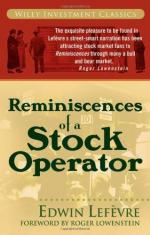
|
| Name: _________________________ | Period: ___________________ |
This test consists of 5 short answer questions, 10 short essay questions, and 1 (of 3) essay topics.
Short Answer Questions
1. After Livingston gets used to Wall Street, how much does he reach at one point in the early part of his career?
2. What don't the new bucket shops in Boston allow?
3. What does Livingston say will happen in a stock or commodity if a surprise event occurs?
4. How old was Livingston when he made his first $1000?
5. Why is Livingston having a hard time increasing his money?
Short Essay Questions
1. What happens to Livingston in St. Louis?
2. What happens when Livingston first comes back from St. Louis?
3. What does Livingston say must be available in order to sell a stock and why?
4. What kind of trader does Livingston hear had a bad loss and what does he do about it?
5. What job did Livingston have when the book opened and how are stock quotes done?
6. Why is Livingston still losing money on Wall Street?
7. What does Livingston say one should do in a rising or falling market?
8. What do customers in bucket shops do?
9. How much regulation is there in the stocks in Livingston's era and how did that affect the stocks?
10. How did Livingston make a lot of money in cotton?
Essay Topics
Write an essay for ONE of the following topics:
Essay Topic 1
Having patience and waiting until the right moment is an important aspect of successful trading.
1. Explain, using examples from the book, what you think is meant by this statement.
2. Discuss two situations in your own life that requires patience and good timing.
3. Do you think Livingston's advice could be used in situations other than trading on Wall Street? Why or why not?
Essay Topic 2
Livingston discusses the patterns various stocks show and how charts can be kept of these patterns and compared to market trends. By applying certain rules to the patterns, traders can decide if it is a good time to buy or sell a particular stock. Only the best traders make money with this approach.
1. Why does Livingston say only the best traders make money by using the patterns? Use examples from the book to support your answer.
2. Discuss several other situations in life where studying patterns are the best way to understand a situation.
3. Does this statement of Livingston's seem too simplistic, considering how few people actually make money in the stock market? Why or why not?
Essay Topic 3
He considers commodities down to earth and less prone to complex maneuvering than stocks. They are affected by supply and demand and conditions that don't affect stock as much.
1. Why do you think Livingston thinks the above statement is true? Use examples from the book to support your answer.
2. Having read the entire book do you think trading in commodities would be easier than in stock? Why or why not?
3. Given the differences in transportation and the wider global market do you think commodity trading has become more complex? Why or why not?
|
This section contains 1,028 words (approx. 4 pages at 300 words per page) |

|




